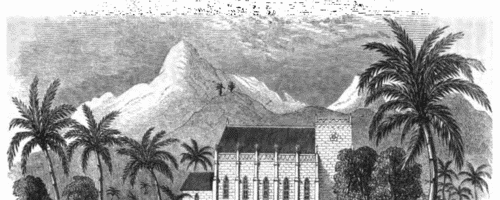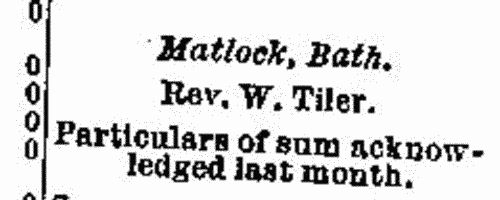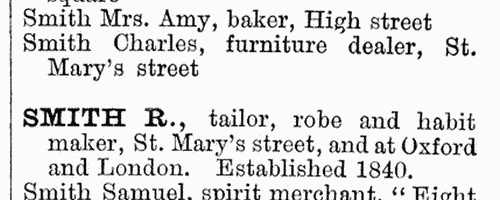Mattingly Surname Ancestry ResultsOur indexes 1850-1950 include entries for the spelling 'mattingly'. In the period you have requested, we have the following 19 records (displaying 1 to 10): Buy all | | | Get all 19 records to view, to save and print for £94.00 |
These sample scans are from the original record. You will get scans of the full pages or articles where the surname you searched for has been found. Your web browser may prevent the sample windows from opening; in this case please change your browser settings to allow pop-up windows from this site. Missionary donations from Wiltshire
(1855)
The Congregational and a number of other independent churches together formed the Evangelical Alliance, committed to promoting and supporting missions to the heathen. The areas chosen for their projects were Guiana, South Africa, India, the South Seas and China. The work of the missionaries was not only in preaching the Gospel, but also in translating the Bible into local languages, and establishing churches, schools and orphanages. Orphans and native teachers were often given the names of principal contributors or congregations back in Britain. In Britain the large amounts of money needed for this work were raised among the Congregational and independent congregations, arranged by auxiliaries for each county (although some contributions for each county might in fact come in from congregations and individuals in neighbouring areas); money was gathered by ministers, at special services, by supporters, and in missionary boxes. The accounts of all these contributions were published as part of a monthly magazine called the Evangelical Magazine. Each issue of the magazine carried obituaries of prominent members of the congregations; general articles on religion; reviews of newly-published religious books; home news, mainly about meetings of importance or interest by the alliance or in individual churches; and then a separate section called the Missionary Chronicle. The Missionary Chronicle was devoted to letters and reports from the missionaries; and concludes with a set of accounts of donations towards the missionary work. This is the index to the donations reported in the magazine, January to December 1855, from Wiltshire.MATTINGLY. Cost: £6.00.  | Sample scan, click to enlarge

|  London Policemen
(1843-1857) London Policemen
(1843-1857)
The Metropolitan Police Register of Joiners (MEPO 4/334) lists policemen joining the force 1 January 1843 to 1 April 1857 (warrant numbers 19893 to 35804). The register is alphabetical, in so far as the recruits are listed chronologically grouped under first letter of surname. It gives Date of Appointment, Name, Number of Warrant, Cause of Removal from Force (resigned, dismissed, promoted or died), and Date of Removal. Although the register was closed for new entrants at the end of 1842, the details of removals were always recorded, some being twenty or more years later. Those recruits not formerly in the police, the army, or some government department, were required to provide (normally) at least two letters of recommendation from persons of standing, and details of these are entered on the facing pages: the names in these are indexed separately - this index refers only to the police constables. Where a recruit was only recently arrived in the metropolis, the names and addresses of the recommenders can be invaluable for tracing where he came from.MATTINGLY. Cost: £8.00.  | Sample scan, click to enlarge

| Long-stay Paupers in Workhouses: Wantage
(1861)
This comprehensive return by the Poor Law Board for England and Wales in July 1861 revealed that of the 67,800 paupers aged 16 or over, exclusive of vagrants, then in the Board's workhouses, 14,216 (6,569 men, 7,647 women) had been inmates for a continuous period of five years and upwards. The return lists all these long-stay inmates from each of the 626 workhouses that had been existence for five years and more, giving full name; the amount of time that each had been in the workhouse (years and months); the reason assigned why the pauper in each case was unable to sustain himself or herself; and whether or not the pauper had been brought up in a district or workhouse school (very few had). The commonest reasons given for this long stay in the workhouse were: old age and infirm (3,331); infirm (2,565); idiot (1,565); weak mind (1,026); imbecile (997); and illness (493). MATTINGLY. Cost: £6.00.  | Sample scan, click to enlarge

| Civil Service Appointments
(1862)
The Civil Service Commission published an annual list of all persons who had obtained certificates of qualification for appointment in the various public departments. The list gives full name (surname first); department (such as Post Office, or Inland Revenue); situation (such as Letter-carrier, or Clerk); and date of certificate. Candidates whose names are preceded by a dagger obtained appointments as the result of competition; a double dagger indicates open competition. Those whose names are preceded by an asterisk obtained honorary additions to their certificates either for proficiency in extra subjects chosen by themselves, or for marked proficiency in the prescribed subjects. Then follows a further list of these candidates who had obtained Honorary Additions to their Certificates in this way: giving name (surname and initials); position in the service (department and situation); subjects for which honorary additions were made; and 'extent of knowledge displayed' (such as Creditable, Fair, or Very Creditable). 1 January to 31 December 1862.MATTINGLY. Cost: £4.00.  | Sample scan, click to enlarge

| Missionaries and contributors
(1864)
The Evangelical Magazine and Missionary Chronicle records the work of Christian missionaries throughout the world, and of the supporting missionary societies collecting money for the work in the British Isles. Contributions are listed by congregation, and by family members making donations.MATTINGLY. Cost: £8.00.  | Sample scan, click to enlarge

| Inhabitants of Fernham in Berkshire
(1877)
Gentry, farmers and traders listed in J. G. Harrod's Royal County Directory of Berkshire. (The sample scan is from the section for Wallingford)MATTINGLY. Cost: £6.00.  | Sample scan, click to enlarge

| Elementary Teachers in Westminster
(1880)
The National Union of Elementary Teachers, established in 1870, brought together members of the profession throughout England and Wales, organized in local Teachers' Associations. Lists of members of the associations were printed in the annual reports. Each association's officers are listed first, then the ordinary members. Surnames are given, Mr/Mrs/Miss, initial(s), and the name of the school - B. S., British School; Bd. S., Board School; Congl. S., Congregational School; End. S., Endowed School; Gr. S., Grammar School; N. S., National School; Par. S., Parochial School; Pres. S., Presbyterian School; R. C. S., Roman Catholic School; Undl. S., Undenominational School; W. S., Wesleyan School.MATTINGLY. Cost: £6.00.  | Sample scan, click to enlarge

| City of Oxford Electors
(1882)
The electoral register for the City of Oxford for 1882 lists persons entitled to vote at any election of a member or members to serve in parliament for the city or parliamentary borough of Oxford in that year. The names are arranged alphabetically in the parishes of Saint Aldate, Binsey, Saint Clement, Cowley, Saint Ebbe, Saint Giles, Headington, Holywell, Iffley, Saint John, Saint Martin, Saint Mary Magdalen, Saint Mary the Virgin, Saint Michael, North Hincksey and South Hincksey (in Berkshire), Saint Peter in the East, Saint Peter le Bailey, and Saint Thomas. In each case the voter number (out of a total of 6190) is given in the first column; then full name, surname first; place of abode; nature of qualification (such as house, &c.); and the name and situation of the qualifying property (often the same as the place of abode). At the end of each parish there is a list of freemen to be registered as parliamentary voters, with number, full name (surname first) and place of abode; and a list of lodgers registered as parliamentary voters, with number, full name (surname first), description of rooms occupied, and whether furnished or not, address, amount of rent paid, and name and address of landlord.MATTINGLY. Cost: £4.00.  | Sample scan, click to enlarge

| Shorthand Writers
(1884)
Lists of members of the Phonetic Society, reports of Shorthand Writers Association and other meetings, news and advertisements, from the Phonetic Journal.MATTINGLY. Cost: £6.00.  | Sample scan, click to enlarge

| Boys entering Merchant Taylors' School in London
(1900)
Merchant Taylors' School was founded by members of the livery company of the merchant taylors of the city of London in 1561 as a grammar school. By the 19th century this was a major English public school. In 1875 the school removed from Suffolk Lane, in the City, to a new building in Charterhouse Square in Finsbury. In 1907 the Reverend William Baker, a former headmaster, published this school register for the period 1871 to 1900, which we have indexed by year of admission. Each entry gives the boy's name in full (surname, christian name(s)); date of birth; names of both parents (middle names as initials); occupation of father; career summary; and (in italics) address as of 1907.MATTINGLY. Cost: £6.00.  | Sample scan, click to enlarge

|
| 1 | 2 |  |
Research your ancestry, family history, genealogy and one-name study by direct access to original records and archives indexed by surname.
|













